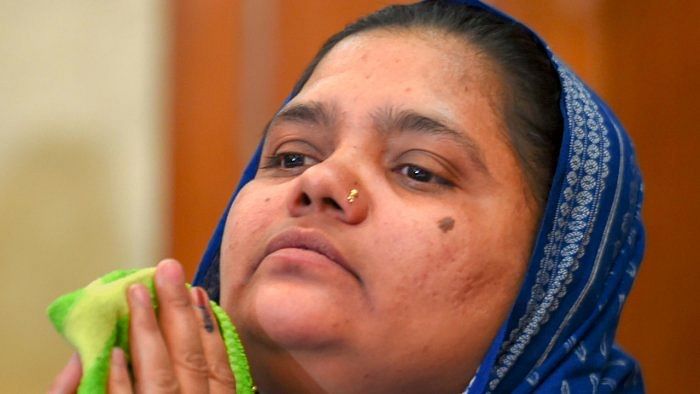
Neither the reception by relatives to the 11 convicts in the Bilkis Bano case after their release, nor their garlanding at the VHP office, should shock us. It's not the first time these men, who gang-raped women and killed 14 innocents, including Bilkis Bano's infant daughter, are being honoured. The day they were sentenced to life in Mumbai in 2008, this reporter saw people touch their feet in the trial court. The courtroom was packed with villagers from Randhikpur, the mood overwhelmingly sympathetic to the guilty. Snide remarks were made against the alleged "bounty" given to Bilkis (there was none). Even others present in court for unrelated matters muttered that shifting the case from Gujarat to Mumbai was a "conspiracy against Hindus". One of those sentenced even declared that he'd done what he had "for God", and that it was "a crime in Hindustan" to belong to the Vishwa Hindu Parishad.
If such was the sympathy just after the court had found them guilty, aarti and sweets on their release from jail are only to be expected, specially from relatives, who often refuse to believe that their family members are guilty. As for the VHP, they've never regretted their actions in Gujarat following the burning of the Sabarmati Express on February 27, 2002, at Godhra, in which 59 Hindus died. They bragged about these violent acts to `Tehelka' journalist Ashish Khetan; these tapes were telecast on national television and authenticated by the CBI.
This lack of remorse for rape may perhaps spring from an ideological basis. In his book `Six Glorious Epochs of Hindu History', Sangh Parivar icon Veer Savarkar lamented Shivaji's honourable treatment of the womenfolk of the Muslims he vanquished. The Maratha emperor should have recalled the way Muslim invaders had treated Hindu women, wrote Savarkar.
What should bother us is the State's attitude towards these rapists and murderers. That a committee headed by a Collector, which included a Superintendent of Police, a district judge and a Jail Superintendent, could have unanimously decided that these men deserved freedom, the greatest gift a convict can receive, is shocking. Did the Jail Superintendent not remember other convicts serving life terms for lesser crimes? Did the district judge consider why all judges who'd heard the case, right from the trial court to the Supreme Court, had thought life imprisonment fit punishment for these men? None of the six senior officers of the Gujarat government on the committee seems to have been willing to risk displeasing their political masters. That's as much a comment on the hallowed IAS/IPS they belong to, as on the way the Gujarat government functions.
The Gujarat 2002 pogrom saw the kind of sexual violence against women witnessed only during Partition, and what Bilkis Bano suffered ranked amongst the worst. Yet, justice took a long time and would have eluded her if some of the country's most valued institutions had not worked together: the NHRC, the Supreme Court, the CBI. Her fight began in 2002 and ended in 2019, when the Supreme Court ordered that she be paid Rs 50 lakh compensation, and given a house and a job. The house has not yet been given.
Bilkis Bano's was not the only case in which the NHRC played a role. It's worth noting that though Justice J S Verma was appointed the NHRC chairman by Atal Bihari Vajpayee's government in November 1999, that didn't stop the NHRC from intervening in Gujarat suo moto, even though the state was ruled by the same party as the Centre. It sent a notice to the Gujarat government as early as March 1, 2002. Its preliminary comments following a visit to Gujarat indicted the state government for its "failure to protect the Constitutional rights of the people of Gujarat, starting with the tragedy in Godhra and continuing with the violence that ensued.." Interestingly, the state government, headed by Narendra Modi, did not bother to reply to the NHRC's preliminary report, despite reminders.
The same contempt towards the NHRC has been shown today by Modi's successor in Gujarat. The country's foremost human rights body got one of our best criminal lawyers, Harish Salve, to represent Bilkis Bano in the Supreme Court, thereby giving her fight for justice the push it needed. The CBI put its all in cracking a difficult case under a hostile state government.
Both the CBI and Harish Salve have come a long way since. What of the NHRC? It backed Bilkis Bano when all avenues had been blocked to her in Gujarat. Will NHRC chairperson Justice Arun Mishra abandon her when she finds herself in the same situation today?
(Jyoti Punwani is a senior journalist)
Disclaimer: The views expressed above are the author's own. They do not necessarily reflect the views of DH.